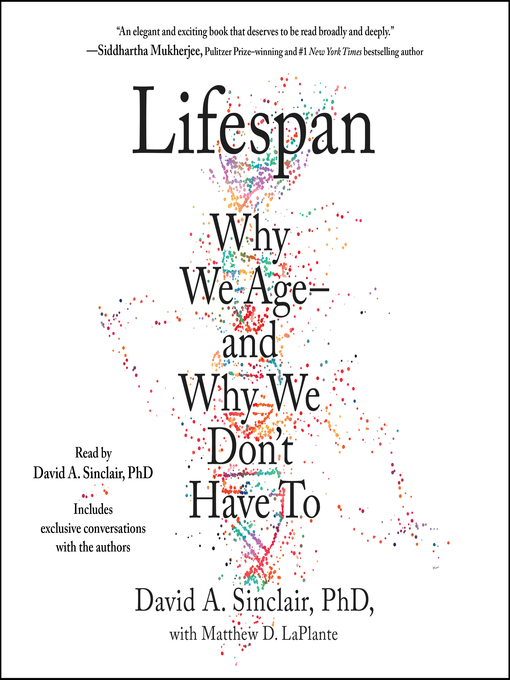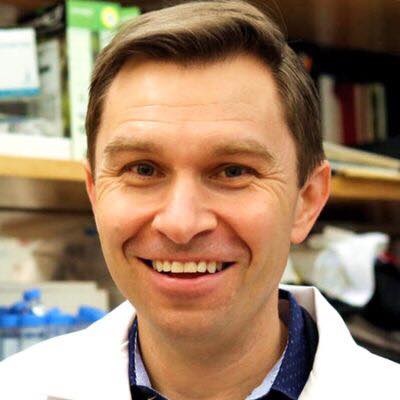
He is also the co-founder of Life Bioscience . This is such a family of companies aimed at extending life. Those who analyze biotech companies will immediately pay attention to the fact that the site of this company does not have a Pipeline section - a section devoted to clinical research. And there is no Science section - where were the articles used. It’s not that it’s really bad at all, but we just note such a detail. True, there is good on this site: the company focuses on several important areas - mitochondria, epigenetics, inflammation and more. And the design is pretty.

David Sinclair.
And in a tweet, he gave advice on how to live for everyone:
“What science says about maximizing life:
- Eat less often. (Eat less often.)
- Avoid sugar and high GI foods. Eat plants that have had stress. (Avoid sugar & high GI foods. Eat stressed plants.)
- Do “hip-hinge” exercises, stretching, “bring yourself to shortness of breath” several times a week. (Do hip-hinge exercises, stretch, pant a few times a week.)
- Block the blue light. Sleep well. (Block blue light. Sleep well.)
- Calm your mind, never lie, do not hate. (Calm your mind, never lie, don't hate.)
- Have close friends and pets. (Have close friends & pets.) ”

twitter.com/davidasinclair/status/1193579242971418629?fbclid=IwAR3M0wBKxs647_PAEcUd7swB_4zMpeNKSD6BNoOiC34nCTdfkG4FoxxlTBY
Plants that have had stress! Sounds intriguing. Don't forget, these are tips from America's Longevity Research Leader.
I immediately had a bunch of questions, but then I thought - what if all the answers are already in the comments? There are already 155 of them.
@neurosomething
Scientific basis for # 5?
@neurosomething
In addition, what is life maximization? Life span? Quality of life (measured by how?) Happiness? Maintaining health? I know that Twitter is not exactly the same as Nature / Science, but still.
The most popular commentary question is about plants that have had stress.
Here's an example of such (free translation):
“Something I do not want to eat these stressful plants. Suddenly their anxiety will pass over to me. ”
“Stressed plants? Do I need to put cuffs on cabbage? To offend asparagus? ”
“Can I buy a stressed plant or can I buy normal ones and yell at them or what?”
In general, Sinclair’s audience is interesting. A lot of smart commentators. You can’t sell such a tweet to them.
For example, a certain @RokoMijicUK wrote:
> "Eat Stressed Plants."
How much of this advice is actually corroborated by causation, and how simple is a summary of the correlations? Is it a new “drink one glass of wine a week”? Are they supported by any high-quality RCTs?
To which Sinclair answered vague:
“Nothing in science is considered proven until it turns out that this cannot be refuted. And even then it often needs to be adjusted. The ideas in the article in Cell, to which I give a link below, however, are intended to explain a large amount of data that otherwise does not make sense. This certainly doesn’t mean that one glass of wine a day will cure diabetes. ”(Nothing in science is ever proven until it fails to be disproven, and even then it often needs adjustment. The ideas in the linked Cell article, however, are meant to explain a lot of data that makes no sense otherwise. That sure doesn't mean one (emoji glass of wine) a day will cure diabetes.
And in response to another comment, David writes:
@davidasinclair
“When plants experience dehydration / fungi / excess light, they form xeno-organic compounds: xeno (between species), hormesis (what doesn't kill you makes you stronger). It is they who activate cell protection networks in such a way as to prepare for a possible food shortage. ”
And about the xenogormesis article threw, 2009, his own .
This is the same article in Cell that he referred to in another comment. The article is not that the results of any experiment, the hypothesis of xenogormesis is rather put forward there. We suggest that you familiarize yourself with the text of this article and decide whether it is possible to confirm the hypothesis with a link to the article in which the hypothesis is proposed.
Sinclair also commented on point 3 - “bring yourself short of breath several times a week” (pant a few times a week). When asked what this means, he answered like this:
@davidasinclair
Stay out of breath. So that it was impossible to continue the conversation. See pages 102-106 of the Lifespan book.
(Lose your breath. Can't carry out a conversation. See p.102 - 106 of Lifespan)
#lifespanbook #lifespan #IronMan #runners #CrossFit #Spartans
Of course, he referred to his little book, neatly arranged the tags. But then David left unanswered comments. Comments are good, we will give them here.
Here's an example about blue light:
@jsnover What is the scientific basis for claims to blue light? Everything I read says it's not true
@drneilstanley Given that we have developed under a blue sky, it's just interesting how, in your opinion, blocking blue light will help. Please provide data that shows that this “maximizes life”
And the answer from one of the commentators:
@chris_burbano
What about blue light, it refers to an article in Harvard Health Publishing, which does not list the authors or the original study. There is no consensus that blue light affects the circadian rhythm. ( Well, here is the article ).
About hip-hinge is also unclear. By definition, from Men's Health magazine (correct me, who knows fitness, if it’s not):
““ Hip hinge ”, literally translated, it means“ door hinge in the hips ”. You need to keep your back absolutely straight, while bending in the belt, as if your bottom to the hips and the top after them are two parts of the door hinge. “
Something is not clear why hip-hinge, and not to me alone.
@justy_rojas
Hip-hinge? Do you mean sex?
@barebonesyoga
Hey. Yoga teacher in touch. Why precisely hip hinge movements?
@NickKilmartin
· Why hip hinges, David? Never seen this before.
@jonnyweeno
Where can I read about the benefits of hip hinge?
The question still hung in the air, David did not answer. But the bribes from him are smooth: he wrote in the profile header that his tweets are not medical recommendations. And wrote: “David Sinclair. Harvard professor working on aging. Tweets are not medical recommendations. Written by Lifespan - Books and Newsletters. ”
Did you notice the catch? Here he writes in a tweet that all of his 6 points are proved by science, but there is no evidence. Tips are not medical recommendations. And he himself is a Harvard professor, so if he said anything, it kind of automatically turns out that he is still an authority. And if this is not enough, you can refer to your Lifespan book.
But Sinclair’s audience is pretty. They can’t be tweeted like that, they need clinical research and scientific evidence.
What do you think about Sinclair and his approach?